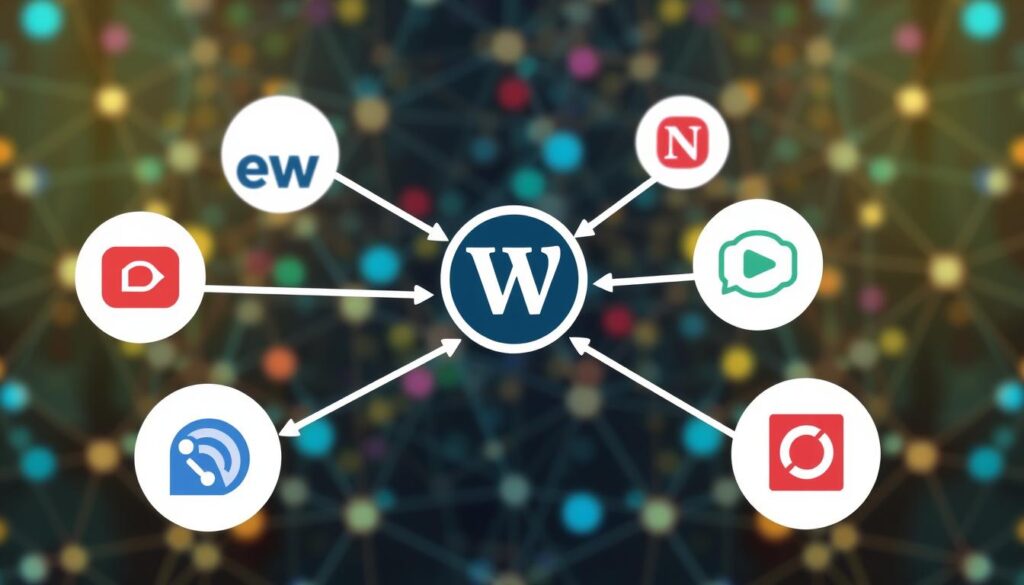Do outbound links really affect your website’s SEO, or is this just a myth? With search engine algorithms always changing, knowing how outbound links help or hurt SEO is key for digital marketers and website owners1.
In SEO, many old ideas and wrong practices can slow down a website’s growth. One wrong idea is thinking that outbound links hurt your link authority and lower your search rankings1.
But Google has recently changed this old belief. The search engine leader says that outbound links, when used smartly, can boost your SEO efforts1.
Key Takeaways
- Google has debunked the myth that outbound links negatively impact SEO performance.
- Outbound links can improve user engagement, build trust, and foster industry partnerships.
- A well-planned outbound linking strategy is crucial for leveraging the benefits of external links.
- SEO experts emphasize the importance of discerning link selection, using smart link attributes, and regularly auditing outbound links.
- Google values outbound links to authoritative sources that provide value to users.
Understanding Outbound Links
In the world of SEO, outbound links are key to a website’s success and trustworthiness. They are hyperlinks that lead readers from your site to other websites2. These links connect your audience to useful articles, research, or trusted websites3.
What are Outbound Links?
Outbound links are a key part of a strong SEO plan. They are different from inbound links, which come from other sites to yours2. Both types of links are important for SEO, but finding the right balance is crucial for a healthy link profile3.
Difference Between Outbound and Inbound Links
Inbound links (backlinks) get a lot of attention in SEO, but outbound links are also crucial. They show you care about giving your audience valuable info from trusted sources. This can boost your site’s search rankings and improve user experience3.
“Linking out to other high-quality websites not only helps users, but can also be beneficial for your own site’s SEO and rankings.” – Google Webmaster Guidelines
Types of Outbound Links
There are two main types of outbound links: dofollow and nofollow4. Dofollow links can pass link equity and help with SEO rankings5. Nofollow links, on the other hand, don’t pass any authority to the site they link to.
Outbound links can be found in many places, like comments or forum posts4. Sometimes, websites change URLs or remove pages, causing broken links4. The nofollow attribute is often used to show the website doesn’t endorse the linked content4.
| Link Type | Description | Impact on SEO |
|---|---|---|
| Dofollow | The default outbound link that can pass link equity | Can potentially influence the target website’s SEO rankings |
| Nofollow | Coded with the rel=”nofollow” attribute, telling search engines not to crawl the target URL or pass any authority | Does not pass any link equity or influence the target website’s SEO rankings |
Knowing the difference between dofollow and nofollow links is key for a good outbound linking strategy5. The choice between them depends on the context and what you want to offer your readers6.
Importance of Outbound Links for SEO
Outbound links connect your content to the wider web, playing a key role in boosting your SEO. By adding relevant external links, you make your pages more valuable and informative7. These links can back up facts, guide readers to more content, or give extra info on topics you don’t fully cover7. This shows search engines your site is a trusted source of info7.
This can make your website more credible, seen as an expert in your field, and improve its search rankings8.
Amplifying Topical Relevance
Linking to relevant content outside your site makes your pages clearer to Google and your readers7. It shows you know your stuff and can lead to better search rankings8.
Adding Value and Building Trust
Outbound links make your content richer and build trust by showing where you get your info from8. Linking to trusted sites shows you know how to find good info, making you look like an expert8. This can make your site better for users and improve your search rankings8.
“External links are more likely to be relevant, especially when they back up stats and data, direct readers to recommended content, or provide additional information on topics not covered by the website.”7
Google Debunks Outbound Links For SEO
Google has changed its view on SEO strategy optimization and outbound links. A leaked document shows that Google now looks at link weight, the number of links to a site, and the link between domains9.
Before, Google said outbound links didn’t matter much for rankings. But now, their google algorithm insights show otherwise9.
SEO experts used to think adding a few links in a blog post helped. But Google’s John Mueller says the number of links or words doesn’t count for much with google algorithm updates910.
Mueller suggests focusing on writing for your audience, not just on link or word counts10. Google also talks about linking to trusted sites, showing a new view on outbound links9.
SEO strategies have changed to avoid being seen as spammy by Google’s algorithms9. Now, SEOs link out more, following Googlers’ advice9. Linking out is now seen as a key SEO practice, not just to keep PageRank9.
There’s been a lot of debate on the role of outbound links in SEO over the years. This debate reflects how SEOs have adapted to Google’s changing algorithms9.
Myths About Outbound Links
Search engine optimization (SEO) is full of myths, and outbound links are no exception. Many think linking out can hurt their rankings. But, this isn’t true. Outbound links are key to the web’s connected nature and can boost a site’s SEO11.
Fear of Linking Out
It’s a myth that linking to other sites can hurt your rankings. Google says most sites link out, which is how the web works12. These links aren’t a ranking penalty12.
All Outbound Links Should Be NoFollow
Some think all links should be NoFollow, telling search engines not to follow them. But, use NoFollow only for ads or non-editorial links. Using it on all links can reduce your content’s value11.
Linking To Authoritative Sites Help SEO
Linking to top sites doesn’t automatically boost your SEO. While good links add value, Google looks at the link’s relevance to users, not just the site’s authority11.
Focus on giving your readers the best experience. By understanding these myths, you can use outbound links to make your content better11.
The web is a connected system, and outbound links are part of it. Use them to improve your content, build relationships, and give your readers the best info1112.
Best Practices for Outbound Linking
Outbound links have changed a lot since the early internet days5. They help prove facts, guide users to more info, and share link equity, which is key for SEO5. To get the most from outbound links, it’s key to know the best ways to use them.
Discerning Link Selection
Choose outbound links carefully, making sure they fit well in your content5. They should be for citations or extra resources for your readers5. Sites linking to yours can be a sign of quality info to search engines5. Links from trusted sites boost your credibility and show you know your stuff5.
Smart Use of Link Attributes
Use link attributes like Nofollow, Sponsored, or UGC wisely to tell search engines about your links4. The nofollow tag tells search engines you don’t back the linked content4. Clear anchor text for links helps both users and search engines get what the link is about4.
Regularly Audit Outbound Links
Check your outbound links often to keep your content fresh by fixing broken links or outdated info5. Tracking link clicks in Google Analytics shows you what users do with those links5. Linking to good or bad sites affects your site’s trust and SEO in different ways5.

By following these tips, you can make sure your outbound links are useful, help your readers, and help your SEO54.
Impact of Outbound Links on User Experience
Outbound links help with SEO and make your website better for users. They give readers more information and trustworthy sources. This makes your site more valuable and builds trust with your audience13.
Google says quality content and engaging with users are key for SEO13. Outbound links add to your content’s authority and improve user experience, not just your search ranking13. So, focus on making links helpful for readers, not just for SEO13.
Using nofollow links is important to tell search engines which links don’t count for ranking13. It’s better to have a few good links than many bad ones for a better user experience13. Google looks at link quality by checking if they are relevant and from credible sources13.
Now, we see that it’s not just about how many links you have, but their quality and purpose13. Experts at LinkGraph suggest adding links that help readers, not just for SEO13. They offer SEO services that make links useful resources, not shortcuts13.
Google is now focusing more on content quality, making it a top priority for SEO13. By making your link strategy focus on quality, you’ll improve your site’s user experience and success13.
Outbound Link Building Strategies
Creating a strong outbound link building strategy can boost your website’s SEO. It means finding the right sites to link to, adding links in your content, and checking how well they work14.
Choosing the right links is key. Not all links are the same. Pick high-quality sites that match your content and help your readers13. This makes your site more trusted and can help it rank better14.
Where you put links matters too. Try to add them in a way that makes sense and helps your readers. Don’t overdo it or link to things that aren’t relevant, as search engines might see it as spam13.
Checking your links often is important. Make sure they work and go where they should. Also, think about using nofollow links for some links that don’t help your SEO13.

By using these tips, you can make outbound link building a strong SEO tool. It can bring more visitors to your site, make it better for users, and help your rankings1413.
Measuring the Success of Outbound Links
It’s key to track and analyze your outbound linking strategy to see how it affects your SEO performance. By looking at important metrics, you can make smart choices to improve your strategy and get better results.
Tracking Metrics
First, track how many outbound links you have and where they lead. Organic search traffic is important to watch each month to see how well your site attracts visitors from search engines15. Also, keep an eye on backlinks to see how your site is viewed and its effect on search rankings15. Don’t forget to watch bounce rate and average session duration to see how engaging your content is and where you can do better15.
Look at keyword rankings to see how your content ranks for specific keywords and their value15. Setting clear SEO benchmarks helps you track your progress and make smart changes15.
Analyzing Results
Check your data often to spot trends and patterns that help your linking strategy. Look at changes in traffic, engagement, backlinks, and keyword rankings to see how your links affect your site15. This way, you can tweak your links to match your SEO performance goals15.
It’s important to balance giving value to your readers with optimizing your links for SEO. By keeping a close eye on the right metrics, you can keep improving your strategy and see real results for your site.
“Monitoring organic traffic is critical for understanding audience engagement and content effectiveness, allowing for adjustments to SEO strategies.”15
| Metric | Benchmark | Time Frame |
|---|---|---|
| Organic Traffic Growth | 25% Year-over-Year | 6 months |
| Conversion Rate | 1% increase | 1 year |
| Keyword Rankings | Achieve top 3 rankings | 6 months |
Adjusting Your Outbound Linking Approach
The digital world is always changing. It’s important for website owners to check and improve their outbound linking often. This helps keep your links useful for your SEO strategy adjustment and link profile optimization16.
Think about who you link to. Finding new, important, and trusted sources to link to can make your site better for your visitors. Also, checking your links often to remove old or wrong ones keeps your link profile strong17.
- See which links get the most clicks and work on those relationships.
- Look for chances to add quality, relevant guest posts or reviews for valuable backlinks17.
- Use videos and blog aggregators to get more attention and find new links17.
Being active and flexible with your links makes sure your site is great for users and follows search engine changes16. This approach will boost your link profile optimization and help with your SEO strategy adjustment161718.,,
| Metric | Improvement |
|---|---|
| Bounce Rate | 34% lower on average16 |
| Search Ranking | 4 positions higher16 |
| User Engagement | 69% more time spent on pages16 |
| Organic Traffic | 123% increase over 3 years16 |
| Ranking Position | 16 spots improvement16 |
| Domain Authority | Increased from 76 to 91 in 2 years16 |
“Websites that link out to authoritative resources have a 34% lower bounce rate on average.”16
Conclusion
Recent insights from Google have debunked old myths about outbound links and SEO13. It turns out, the search engine does look at external links when deciding how to rank websites5. By knowing how to use outbound links well, you can make your website better and give users a great experience13. As the internet changes, being up-to-date with your linking strategy is crucial for a strong online presence.
External links might not directly boost your rankings like we thought before19. But, using them wisely can still help your SEO in big ways5. Linking to trusted sources makes your content more credible and useful for your readers13. Plus, knowing about link attributes like nofollow helps you stay on top of SEO changes.
With the ongoing changes in SEO, it’s important to keep learning and adjusting5. This article has given you tools and strategies to improve your linking. Use them to increase your website traffic and lead your industry.
FAQ
What are outbound links?
Outbound links are hyperlinks that lead readers to other websites outside your own. They connect your audience to useful articles, research, or trusted sites.
What is the difference between outbound and inbound links?
Outbound links go from your site to other sites. Inbound links, or backlinks, come from other sites to yours. Both are key for SEO but must be balanced for a natural link profile.
What are the two main types of outbound links?
There are two main types: Dofollow and Nofollow links. Dofollow links help with SEO by passing link juice to the target site. Nofollow links tell search engines not to follow the link or pass authority.
How do outbound links impact SEO?
Outbound links boost your content’s relevance and value. They strengthen your site’s focus and help Google and readers understand your content better. These links also add depth, build trust, and show your expertise.
Does Google consider outbound links as a ranking factor?
Yes, Google does consider outbound links important for SEO. A leaked Google document shows they look at link weight, backward links, and domain relationships.
Is there a fear of linking out to other websites?
Some worry that linking out will hurt their rankings. But, outbound links are key to the web’s connectivity and don’t harm SEO.
Should all outbound links be Nofollow?
No, not all links should be Nofollow. Use Nofollow for ads or non-editorial links only.
Does linking to authoritative sites automatically help SEO?
No, linking to trusted sites doesn’t automatically boost SEO. Google values the link’s relevance and user value more.
What are the best practices for outbound linking?
For the best outbound links, choose wisely and make sure they fit your content. Use link attributes like Nofollow correctly. Check your links often to keep your content fresh.
How can outbound links impact the user experience?
Outbound links improve SEO and enhance user experience. They offer readers valuable resources, making your site more informative and trustworthy.
How can I develop an effective outbound link building strategy?
For a strong link building strategy, find relevant sites to link to. Place links thoughtfully in your content. Keep an eye on your link performance.
How can I measure the success of my outbound linking strategy?
Track key metrics like outbound link numbers, site authority, click-through rates, and search rankings. Regularly reviewing these will help you refine your strategy.
How should I adjust my outbound linking approach over time?
Update your linking strategy as search engines and user habits change. Re-evaluate your link choices, update or remove old links, and add new valuable resources. Stay adaptable to support your SEO goals.
Source Links
- SEO Benefits of Outbound Links You Must Know in 2024
- Google Dismisses SEO Benefits of Outbound Links
- Do Outbound Links Improve SEO? [Study + Tips]
- Outbound Links and Their Importance in SEO
- What Is an Outbound Link? Insights on SEO External Links
- 5 SEO Insights About Outbound Links
- External Links: Should You Link to Other Websites in Your Blog? — Crafty Copy
- Why Outbound Links are Essential for SEO Ranking – Search Atlas – Advanced SEO Software
- Google Debunks Outbound Links For SEO
- Google senior analyst debunks link quantity myths in SEO practices
- Outgoing links: Are they beneficial for your site or not?
- SEO Linking Question
- Google: Linking To Authoritative Sites Won’t Help SEO – LinkGraph
- Debunking Link Building Myths and Revealing Effective Tactics
- SEO Benchmarks: What Are They & Which Ones Actually Matter | iloveseo.com
- The Outbound Links Confusion: Does Google Still Reward External Links In 2024? – ExpertBeacon
- 40 Effective Methods of Obtaining Quality External Links – Delante Blog
- Secrets from the Google Algorithm leak: insight to boost SEO
- Does Linking Out Improve Your Ranking?






